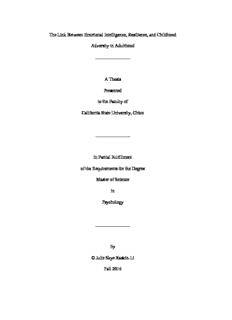
The Link Between Emotional Intelligence, Resilience, and Childhood Adversity in Adulthood A ... PDF
Preview The Link Between Emotional Intelligence, Resilience, and Childhood Adversity in Adulthood A ...
The Link Between Emotional Intelligence, Resilience, and Childhood Adversity in Adulthood A Thesis Presented to the Faculty of California State University, Chico In Partial Fulfillment of the Requirements for the Degree Master of Science in Psychology by © Julie Skye Raskin-Li Fall 2016 THE LINK BETWEEN EMOTIONAL INTELLIGENCE, RESILIENCE, AND CHILDHOOD ADVERSITY IN ADULTHOOD A Thesis by ©Julie Skye Raskin-Li Fall 2016 APPROVED BY THE INTERIM DEAN OF GRADUATE STUDIES: ______________________________ Sharon Barrios, Ph.D. APPROVED BY THE GRADUATE ADVISORY COMMITTEE: ______________________________ ______________________________ Dave Hibbard, Ph.D. Eddie Vela, Ph.D, Chair Graduate Coordinator ______________________________ Pete Lopez, Ph.D PUBLICATION RIGHTS No portion of this thesis may be reprinted or reproduced in any manner unacceptable to the usual copyright restrictions without the written permission of the author. iii DEDICATION This thesis is dedicated to all my fellow human beings, who have faced traumatic events and have found the ability to “bounce back.” May you all find peace, love, and happiness within yourselves, so as to succeed at life. I would also like to dedicate this piece of academic achievement to my parents, Drs. Robert Raskin and Jill Novacek. I am grateful for the role models of excellence you have provided me throughout my lifetime, without your support and positive academic achievement I would not have such a high bar to reach. ❤ iv ACKNOWLEDGEMENTS I would like to acknowledge my gratitude to Dr. Terrry Miller-Herringer, Dr. Eddie Vella, Dr. Lawrence Herringer, and my friend and colleague Brandon Fry for their support and guidance throughout this project. I would like acknowledge Dr. Peter Lopez, for helping me be a better therapist and person, much of who I have become is because of his honest feedback and dedication to his students’ wellbeing. I would like to thank Dr. Elise Cole for her insight and direction in getting this project started. Thank you to my wonderful family, it is because of your unconditional love and support that I am able to be the person I choose to be today. Lastly, I would like to acknowledge my supervisors, Brian Martin and Julie Bartel, of New Beginnings Educational Program for giving me the opportunity to create systemic change in families with violence, this project would not be as successful without the knowledge I have received through working for you both. v TABLE OF CONTENTS PAGE Publication Rights ....................................................................................................... iii Dedication ................................................................................................................... iv Acknowledgments ....................................................................................................... v Table of Contents ........................................................................................................ vi List of Tables .............................................................................................................. viii Abstract ....................................................................................................................... ix CHAPTER I. Introduction ............................................................................................... 1 Statement of the Problem .............................................................. 1 Purpose of the Study ..................................................................... 3 II. Literature Review ...................................................................................... 4 Childhood Maltreatment ............................................................... 4 Biology of Trauma ........................................................................ 9 The Limbic System…………………………………………. 12 Hypothalamic-pituitary-adrenal Axis……………… ............. 15 Pre-frontal & Neocortex……………………………………. 16 Emotional Intelligence .................................................................. 18 Ability Emotional Intelligence……………………………. ... 21 Trait Emotional Intelligence………………………………. .. 23 Mixed Model Emotional Intelligence……………………… . 25 Emotional Intelligence and Mental Health ............................. 27 Resilience………………………………………………………. . 30 Trait Resilience…………………………………………… ... 31 Processes or Systems Resilience………………………… ..... 31 Resilience and Adverse Childhood Experiences……………......... 32 Summary and Study Rationale………………………………. ....... 35 III. Methodology ............................................................................................. 37 vi Participants .................................................................................... 37 Measures ....................................................................................... 37 Adverse Childhood Experience Study……………………… 37 The Trait Emotional Intelligence Questionnaire-Short Form. 39 The Resilience Scale……………………………………....... 41 Procedures ..................................................................................... 41 IV. Findings and Results ................................................................................. 43 Preliminary Analysis ............................................................. 43 Main Analysis……………………………………………… 43 V. Conclusions and Recommendations ......................................................... 45 Emotional Intelligence and Resilience .......................................... 45 Limitations .................................................................................... 47 Clinical Implications ..................................................................... 48 References ..................................................................................................................... 51 Appendices A. Informed Consent Form ............................................................................ 62 B. Institutional Review Board Approval ....................................................... 65 C. Demographics ........................................................................................... 66 D. The Adverse Childhood Experiences Questionnaire ................................ 68 E. The Trait Emotional Intelligence Questionnaire-Short Form ................... 69 F. The Resilience Scale ................................................................................. 70 vii LIST OF TABLES TABLE PAGE 1. The Sampling Domain of Trait Emotional Intelligence In Adults and Adolescent ....................................................................... 39 viii ABSTRACT THE LINK BETWEEN EMOTIONAL INTELLIGENCE, RESILIANCE, AND CHILDHOOD ADVERSITY IN ADULTHOOD By © Julie Skye Raskin-Li 2016 Master of Science in Psychology California State University, Chico Fall 2016 Childhood maltreatment, from the ages of zero to 18, is a pervasive adverse experience that continues to affect the lives of many adults. The Department of Health and Human Services reported in 2014, that there were 702,000 cases of child abuse and neglect. According to Fang, Brown, Florence, and Mercy (2010) the aggregate lifetime cost of child maltreatment is estimated at $585 billion per year. These costs are attributed to life time mental health related issues like post-traumatic stress disorder (PTSD), behavioral problems like criminality and violent behavior, as well as increased risk of chronic physical illness due to chronic stress. Child maltreatment has also been linked to decreased levels of job readiness and long term negative physical disabilities (Fang et al., 2010). Child maltreatment has a multitude of negative residual effects related to mental and physical health outcomes through the lifespan. Examining the relationships between ix emotional intelligence (EI) and resiliency may allow clinicians to develop treatment options that could lead to a decrease in transgenerational patterns of violence. The connection between neurobiology, childhood maltreatment, and emotional resilience were explored as a way to understand the outcomes for mental and physical health problems as a result of child maltreatment. One hundred and twenty-five participants were assessed for levels of emotional intelligence and resiliency using the The Trait Emotional Intelligence Questionnaire Short Form (Petrides, 2009) and The Resilience Scale (Wagnild, 2014), respectively. Participants were also assessed for the presence of adverse childhood experiences using the Adverse Childhood Experience Survey (Felitti & Anda, 1997). Results revealed a significant correlation, r(125) = .534, p < .001, which demonstrates that when an individual is higher in EI they are more resilient to adverse childhood experiences in adulthood. The finding that EI and resilience are related may help clinicians better deal with the deleterious consequences of childhood trauma. x
Description: